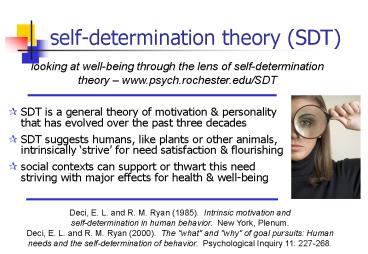self-determination theory (SDT) - PowerPoint PPT Presentation
1 / 2
Title:
self-determination theory (SDT)
Description:
looking at well-being through the lens of self-determination theory www.psych.rochester.edu/SDT SDT is a general theory of motivation & personality that has ... – PowerPoint PPT presentation
Number of Views:55
Avg rating:3.0/5.0
Title: self-determination theory (SDT)
1
self-determination theory (SDT)
looking at well-being through the lens of
self-determination theory www.psych.rochester.ed
u/SDT
- SDT is a general theory of motivation
personality that has evolved over the past three
decades - SDT suggests humans, like plants or other
animals, intrinsically strive for need
satisfaction flourishing - social contexts can support or thwart this need
striving with major effects for health
well-being
Deci, E. L. and R. M. Ryan (1985). Intrinsic
motivation and self-determination in human
behavior. New York, Plenum. Deci, E. L. and R.
M. Ryan (2000). The "what" and "why" of goal
pursuits Human needs and the self-determination
of behavior. Psychological Inquiry 11 227-268.
2
three key psychological needs
- a basic need (whether physiological or
psychological) is defined as an energizing state
that, if satisfied, promotes health well-being
but, if not satisfied, contributes to pathology
and ill-being - autonomy, competence relatedness are three key
basic psych-ological needs how they can best be
satisfied will vary with indi-vidual strengths,
life stage, social context, and culture - personal goals that lead to satisfaction of these
three basic needs will promote well-being, but
individuals due to broad societal conditioning
and personal life history may well strive for
goals that do not satisfy these needs or enhance
their well-being
Ryan, R. M. and E. L. Deci (2000).
Self-determination theory and the facilitation of
intrinsic motivation, social development, and
well-being. Am Psychol 55(1) 68-78.































